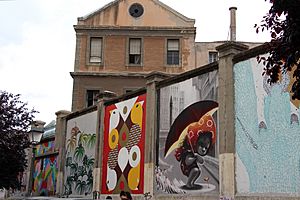La Tabacalera de Lavapiés facts for kids

Street art at the former Tobacco Factory of Embajadores
|
|
| Established | 2010 |
|---|---|
| Location | c/ Embajadores 51 Madrid, Spain |
| Type | Cultural center, Autonomous social center, Art gallery |
La Tabacalera de Lavapiés is a lively cultural and social center in Madrid, Spain. It is also known as the Self-managed Social Center Tabacalera de Lavapiés. This large space covers about 9,200 square meters (97,000 sq ft). It has many connected buildings in the central Lavapiés neighborhood. The Spanish Ministry of Culture owns these buildings. However, since 2010, a local community group has been managing the space. It is a hub for creativity and community activities. You can find a fab lab (a place for making things with digital tools), a theatre, music groups, and art projects here. Many young people see it as a top spot for cultural events in Madrid.
Contents
From Tobacco Factory to Cultural Hub
The buildings that now house Tabacalera were once an old tobacco factory. King Charles III of Spain ordered it built way back in 1781. From 1809, the factory made tobacco products. It employed about 6,000 women workers. The factory was very large, covering about 30,000 square meters (355,000 sq ft).
In 1977, the building was recognized as an important part of Spain's cultural history. It received the special mention of Bien de Interés Cultural. The factory kept working until 1999. That's when the public tobacco company, Tabacalera, became a private company. After this, the buildings were given to the Spanish Ministry of Culture.
A Community Takes Over
For the next 10 years, the building was left empty and not taken care of. Local community groups from Lavapiés started to ask for the abandoned property. They wanted to turn it into a new cultural center for the neighborhood.
Starting in 2004, many activities took place under the name "Tabacalera A Debate." This means "Tabacalera under debate." Many artists and cultural leaders supported this idea. Finally, in 2010, the Ministry of Culture made an agreement with a local group called SCCPP. They agreed to let the group use the property each year. The Ministry saw this as a "pilot experiment" for community involvement. It was meant to help with the social, creative, and intellectual growth of people in the area.
In late 2011, the agreement was renewed. This time, it was with a new group called the Association for the Tabacalera of Lavapiés. The agreement was for 8 years, with a chance to renew it every 2 years. About one-third of the total space, 9,200 square meters, is used by the Self-managed Social Center La Tabacalera de Lavapiés.
What Happens at Tabacalera
The center works based on five main ideas. These ideas were part of its first agreement:
- Self-management: This means the community runs the center itself.
- Participatory democracy: Everyone can take part in decisions.
- Free Culture: They support sharing creative works freely.
- New ways of managing culture: They question traditional ways of running cultural places.
- Community expression: They encourage social and cultural activities.
Because of these ideas, the center quickly became known for hosting many different groups. These groups focus on social, cultural, and artistic activities. The center is managed by open meetings held every two weeks. There are also open committees where people can join. All groups hosted at Tabacalera are asked to be open and equal. Since the center supports the Free-culture movement, many groups share their work using Creative Commons licenses. This means others can use and share their creations easily.
Spaces and Activities
Tabacalera has a large main building and several smaller ones. It also has a community garden, a patio, a bar, a library, a free shop, and a restaurant. It hosts many artistic activities. You can see murals as part of the Madrid Street Art Project. There is also urban graffiti art in its galleries. They also have photo exhibitions, like PHotoEspaña, which is Madrid's big photography festival.
The center has a theatre that offers many performing arts activities. These include theatre plays, circus acts, skateboarding, and dance. There are also many music groups from different cultures, like reggae or afro music. They often hold concerts. Tabacalera also offers workshops where you can learn new skills. These include drawing, cooking, bike repair, sewing, screen printing, legal issues, or video-making.
The center regularly hosts wrestling matches, flea markets, and film festivals. It also holds social and political events like meetings, debates, and lectures. Tabacalera is also home to a hackerspace and the fab lab called Nave Trapecio.
After the 15-M protests in 2011, some people criticized the social center. The President of the Madrid region, Cristina Cifuentes, and some newspapers said it hosted meetings for protesters and people who support migrant rights.
Global Recognition
Time Out magazine wrote about Tabacalera. They said that Lavapiés has many community groups and self-managed centers. La Tabacalera de Lavapiés is the most famous one. It's a shared cultural space where anyone can suggest an idea. You can set up an exhibit, organize a debate, or show a documentary you made. Thanks to places like this, cultural events are very popular in this neighborhood. Locals always support them.
Atlas Obscura magazine called it "one of the most striking examples of Madrid's cultural diversity." They also said it was a "bastion of democracy." Both New York Times and Washington Post have recommended visiting Tabacalera. It has also been called "Madrid's most exciting art space" because of its "vibrant artistic community." People also know it as "Madrid's Most Culturally Diverse Space."
See also
 In Spanish: La Tabacalera de Lavapiés para niños
In Spanish: La Tabacalera de Lavapiés para niños
- Lavapiés
- La Ingobernable
- Patio Maravillas

